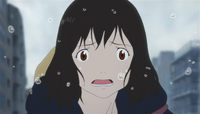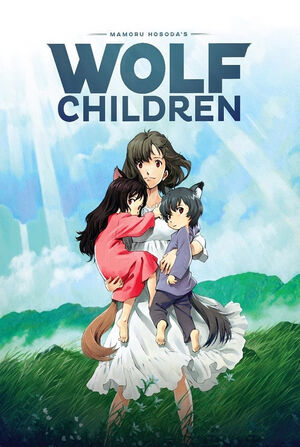
|
This page may contain spoilers. Please view at your own risk.
|
| Information |
- This article is about the film. If you are looking for the manga of the same name, go here.
Wolf Children (Japanese: おおかみこどもの雨と雪, Rōmaji: Ōkami Kodomo no Ame to Yuki (lit. "Wolf Children Ame and Yuki") ) is a 2012 Japanese animated fantasy film directed and co-written by Mamoru Hosoda. The film stars the voices of Aoi Miyazaki, Takao Osawa and Haru Kuroki. The story follows a young mother who is left to raise two half-human half-wolf children, Ame and Yuki, after their werewolf father dies.
Plot[]
College student Hana falls in love with a werewolf and has two half-wolf children with him: a daughter, Yuki, and a year later a son, Ame. Soon after, their father is killed while hunting food for the children.
Hana's life as a single mother is difficult; Yuki and Ame constantly switch between their human and wolf forms, and Hana has to hide them from the world. When she is visited by social workers concerned that the children have not had vaccinations, Hana moves the family to the countryside away from prying neighbors. She works hard to repair a dilapidated house and sustain the family on their own crops.
One winter day, Ame almost drowns in a river after trying to hunt a kingfisher, Yuki saves him and Ame becomes more confident. Yuki begs her mother to let her go to school like other children. Hana accepts on the condition that Yuki keeps her wolf nature secret. Though Yuki's classmates find her strange at first, she soon makes friends. However, Ame is more interested in the forest, and takes lessons from an old fox about survival in the wild. In 4th grade, Yuki's class receives a new transfer student, Souhei, who realizes something is strange about her. When he pursues her, Yuki transforms into a wolf and inadvertently injures him, leading to a meeting with his mother and teacher. Souhei tells them a wolf attacked him, absolving Yuki of blame, and the two become friends.
Yuki and Ame fight over whether they are human or wolf. Two years later, while Yuki is at school, a storm gathers and Ame disappears into the forest to help his dying fox teacher; Hana goes after him. The other children are picked up from school by their parents, leaving Yuki and Souhei alone. Yuki reveals her secret to him by transforming into a wolf. Souhei tells her he already knows, and promises to keep her secret.
As Hana searches the forest for Ame, she slips and falls unconscious. Ame finds her and carries her to safety. She awakens to see Ame transform into an adult wolf and run into the mountains. She realizes he has found his own path and accepts his goodbye.
In the following year, Yuki leaves home to move into a dorm in junior high school. Ame's wolf howls can be heard far and wide in the forest. Hana, living alone in the house, reflects that raising her wolf children was like a fairy tale, and feels proud to have raised them well.
Release[]
At a press conference held on 18 June 2012, the director Mamoru Hosoda announced that Wolf Children would be released in 34 different countries and territories. This film was first released in France on June 25, 2012, marking its international debut. It was subsequently released in Japan on July 21, 2012. The film made its US premiere at the 2012 Hawaii International Film Festival and had a limited release in the US on September 27, 2013. The film's Blu-ray and DVD release date for Japan has been confirmed for February 20, 2013. The Newport Beach Film Festival in Newport Beach, CA, screened Wolf Children on April 27, 2013.
Wolf Children was screened at Animefest 2013 in May in the Czech Republic and at Animafest Zagreb 2013 in June in Croatia.
Reception[]
Box Office[]
Wolf Children was the second-highest grossing film in Japan on its debut weekend of 21–22 July 2012, beating Pixar's animation Brave, which debuted in Japan on the same weekend. It attracted an audience of 276,326 throughout the weekend, grossing 365.14 million yen. The film subsequently surpassed Hosoda's previous work Summer Wars' gross of around 1.6 billion yen during the weekend of 12–13 August 2012. In total, Wolf Children grossed 4.2 billion yen, making it the fifth-highest grossing movie in Japan in 2012.
Critical Reception[]
The review aggregation website Rotten Tomatoes reports a 93% approval rating with an average rating of 8.3/10 based on 15 reviews. On Metacritic, the film has an average score of 66 out of 100, based on five critics, signifying "generally favorable reviews."
Mark Schilling of The Japan Times gave the film three out of five and wrote that "The Miyazaki influence on Hosoda's own work seems obvious, from his cute-but-realistic style to his concern with pressing social issues and the messy emotions of actual human beings". He felt the film was "on the conventional and predictable side ... appealing to Jane Eyre fans in one scene, Call of the Wild fans in the next" and criticized its "well-worn, stereotypical rails".
Thomas Sotinel of Le Monde gave the film five out of five. Dave Chua of Mypaper also praised the film's "magnificent understated eye for detail, from the grain of wood on doors to the lovingly captured forest scenes, that help lift the movie above regular animation fare." Chris Michael of The Guardian gave the film four out of five, writing that "telling the story through the eyes of the harried, bereaved but indomitable mother gives this calm, funny, only occasionally schmaltzy family film a maturity Twilight never reached." Kenneth Turan of the Los Angeles Times described it as "an odd story, told in a one-of-a-kind style that feels equal parts sentimental, somber and strange," and felt the English language performances were inappropriately sweet and simplistic. Steven D. Greydanus, writing in the National Catholic Register, named the film a runner-up in its list of the best films of 2013, writing: "Despite brief early problematic content and an ambiguous climactic letdown, the main story is magic."
Awards[]
Wolf Children won the 2013 Japan Academy Prize for Animation of the Year, the 2012 Mainichi Film Award for Best Animation Film, and the 2013 Animation of the Year award at TAF. It won two awards at the Oslo Films from the South festival in Norway: the main award, the Silver Mirror, and the audience award. It won an Audience Award at 2013 New York International Children's Film Festival and the 2014 Best Anime Disc award from Home Media Magazine.
Possible Monthy Python reference[]
There is a reference to Monthy Python's "search for the holy grail" in the english version. Students are asked "how far an unladen swallow can travel in three hours". Just like everyone throughout Monthy Python's entire movie questions if it is truly possible for a swallow carrying a coconut to fly from Africa to England.

